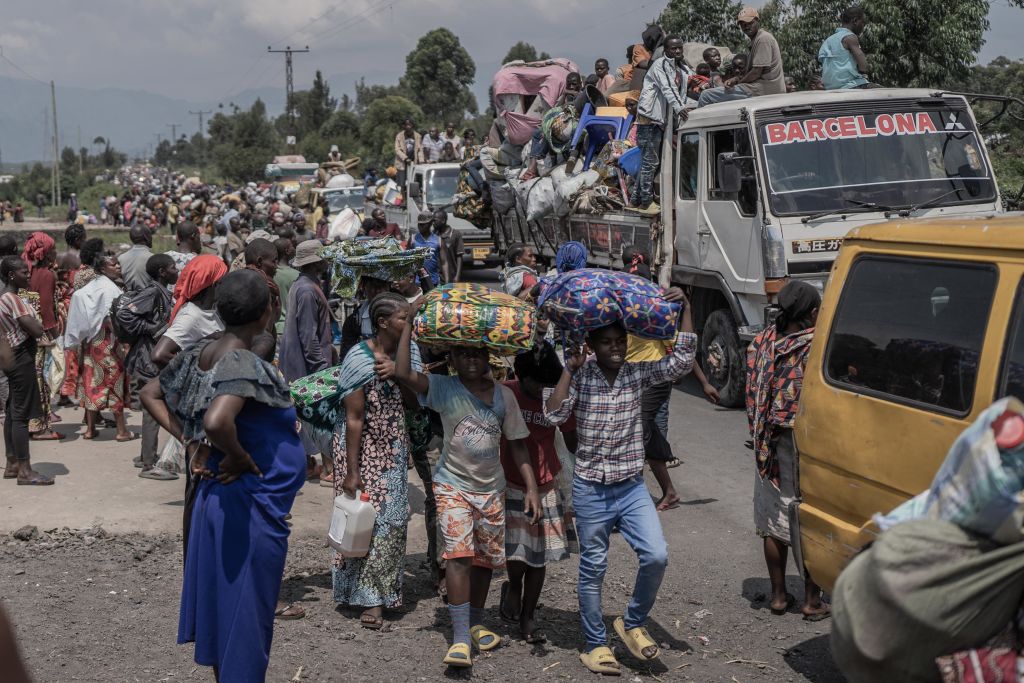ADF STAFF
Although many Rwandans feel their country has made significant progress since the 1994 genocide, tensions between Hutu- and Tutsi-led rebel groups continue to this day and have fueled violence in the eastern Democratic Republic of the Congo.
Over a four-week period in February and March, ethnic violence in the eastern DRC forced about 250,000 civilians to flee to Goma, capital of the North Kivu province.
The conflict has hampered humanitarian efforts — the Tutsi-led M23 rebel group attempted to down a United Nations observation drone near Goma in February — and caused food prices to soar. The M23 is the most notorious armed group in eastern DRC, although dozens of other groups operate there.
In the region, the Hutu-led Democratic Forces for the Liberation of Rwanda (FDLR), formed by people implicated in the genocide, seeks to overthrow the Rwandan government.
In early March, the M23 gained control of Nyanzale, a small town in the eastern DRC that was a key FDLR stronghold.
Formed primarily by former genocidaires, the FDLR also operates in eastern DRC, where it is known to attack Tutsi, and has launched several attacks in Rwanda. In 2019, the FDLR killed 19 people in Rwanda’s western Rubavu district, home to Volcanoes National Park, a tourism hotspot.
Last year, Rwanda increased its deployments of military forces and heavy equipment at the DRC border over fears of FDLR attacks.
Col. William Ryarasa, the Rwanda Defence Force commander in charge of the DRC border districts of Rubavu, Rutsiro and Nyabihu, urged the public to “be more vigilant and also report suspicious elements to the nearest authorities.”
He told community leaders drawn from the three districts “not to allow any smugglers into their areas because grenades and other harmful weapons can be hidden in contraband,” according to a report on Ugandan news website ChimpReports.
Both governments have responded to the violence militarily. As genocide studies academic Christopher P. Davey noted in The Conversation, both governments say their involvement in conflicts in the eastern DRC are linked to protecting ethnic populations.
“In reality, however, the persistent fighting is destroying economies and livelihoods,” wrote Davey, a visiting assistant professor at Binghampton University, State University of New York.
Military actions, Davey argued, do little to address concerns of marginalization or mass atrocities targeting ethnic groups.He advocated for greater international backing and investment in the Luanda Process, which addresses political dimensions between the DRC and Rwanda, and the Nairobi Process, which focuses on disarming rebel groups in the region.
As the world marks the 30th anniversary of the genocide, many young Hutu and Tutsi people in Rwanda now say they do not wish to identify with either ethnic group.
Chrispin Sradulcunda, a 21-year-old engineering student in Rwanda, said he views the genocide as a lesson not to fight and continue telling younger generations about the massacres.
“So it is a lesson we should learn, and hope that it will never happen again. We were not raised in such areas where they’re called Tutsi or Twa, or Hutu,” Sradulcunda told The Guardian. “It’s good, because I wouldn’t love that. Because I believe I’m Rwandan, and being called Rwandan should be the pride one should carry.”
Leonille Niyigena, a 26-year-old tailor in Rwanda, said he is surprised that some former genocidaires and their victims now speak regularly.
“For me, it means nothing to be Hutu or Tutsi,” Niyigena told The Guardian. “Rwanda is a country of law, where the law is followed. It is a country where people feel safe and, for the youth, it’s a country that takes care of us.”
The country is now home to six “reconciliation villages.” In Mbyo, Mukaremera Laurence and Nkundiye Thacien have made peace. Laurence and her husband were friends and neighbors of Thacien, until Thacien was ordered to kill Laurence’s husband with a machete.
But the reconciliation process is not easy.
“We can’t forget; it’s impossible to forget,” Laurence told Al Jazeera. “We live in peace now, but we remember it and always will.”

